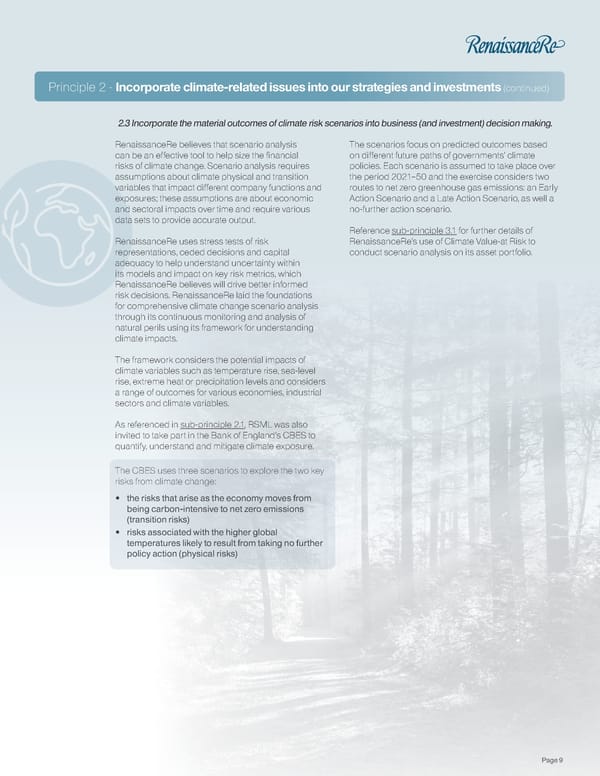Principle 2 - Incorporate climate-related issues into our strategies and investments (continued) 2.3 Incorporate the material outcomes of climate risk scenarios into business (and investment) decision making. RenaissanceRe believes that scenario analysis The scenarios focus on predicted outcomes based can be an effective tool to help size the financial on different future paths of governments’ climate risks of climate change. Scenario analysis requires policies. Each scenario is assumed to take place over assumptions about climate physical and transition the period 2021–50 and the exercise considers two variables that impact different company functions and routes to net zero greenhouse gas emissions: an Early exposures; these assumptions are about economic Action Scenario and a Late Action Scenario, as well a and sectoral impacts over time and require various no-further action scenario. data sets to provide accurate output. Reference sub-principle 3.1 for further details of RenaissanceRe uses stress tests of risk RenaissanceRe’s use of Climate Value-at Risk to representations, ceded decisions and capital conduct scenario analysis on its asset portfolio. adequacy to help understand uncertainty within its models and impact on key risk metrics, which RenaissanceRe believes will drive better informed risk decisions. RenaissanceRe laid the foundations for comprehensive climate change scenario analysis through its continuous monitoring and analysis of natural perils using its framework for understanding climate impacts. The framework considers the potential impacts of climate variables such as temperature rise, sea-level rise, extreme heat or precipitation levels and considers a range of outcomes for various economies, industrial sectors and climate variables. As referenced in sub-principle 2.1, RSML was also invited to take part in the Bank of England’s CBES to quantify, understand and mitigate climate exposure. The CBES uses three scenarios to explore the two key risks from climate change: • the risks that arise as the economy moves from being carbon-intensive to net zero emissions (transition risks) • risks associated with the higher global temperatures likely to result from taking no further policy action (physical risks) Page 9
 2022 ClimateWise Report Page 10 Page 12
2022 ClimateWise Report Page 10 Page 12